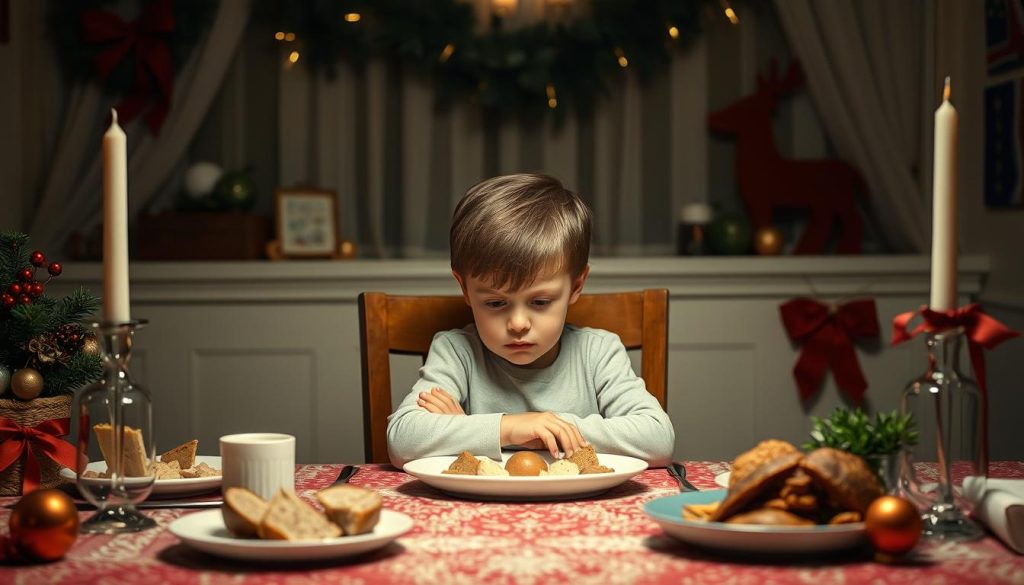Trying to manage an eating disorder during the holiday season is tough. The food-focused gatherings and family expectations add to the stress. Celebrations are meant to be joyful, but they can make things worse for those with eating disorders.
It’s important to think about how to support loved ones with eating disorders during this time. This includes managing family budgeting, gentle parenting, and kids’ screen time. We need to help those struggling with anorexia, bulimia, and binge eating disorders.
Key Takeaways
- Evaluate where your loved one is in their recovery process before expecting participation in holiday events.
- Gently interrupt and redirect harmful comments about food or weight during gatherings.
- It’s essential to have consent when discussing eating disorders with family members.
- Breaking the silence on eating disorders can be beneficial if the family is comfortable with it.
- Setting realistic boundaries and developing an exit plan for gatherings can help manage stress.
- Early intervention and therapy are crucial, especially during the holiday season.
- Support for fellow caretakers is important as caregiving can be emotionally challenging.
Understanding the Impact of Holidays on Eating Disorders
The holiday season can be tough for those with childhood eating disorders. Food and social events make their struggles worse. This leads to feelings of dread, not joy.
For those with anorexia, just seeing or smelling food can cause guilt and turmoil. These feelings make their fight against weakness and loss of control harder.

Those with bulimia and binge eating disorders often hide their eating habits. The holiday food abundance leads to bingeing and purging. This cycle causes emotional pain.
Family issues also play a big part. Conflict and feeling rejected can push people towards their eating disorders. This makes it hard for them to feel close to their family.
It’s also important to help kids with anxiety during the holidays. The stress of holiday gatherings can make anxiety worse. Family support and understanding are key.
A study by the Journal of the American Medical Association (JAMA) found up to 22% of kids and teens have disordered eating. Dr. Shelly Bar says holidays can make guilt and shame about eating worse.
Family talks and focusing on positive topics can help, says therapist Kara Becker. Getting help and support is crucial for managing eating disorders, especially during stressful times like the holidays.
It’s also important to talk about postpartum mental health and puberty. This shows how complex the issue is. By addressing anxieties and stresses, we can create a supportive environment for these needs.
Creating a Support Plan for the Holiday Season
It’s important to plan for self-care before the holidays. This helps manage stress and keep your mental health in check. By focusing on self-care, you and your family can enjoy the holiday spirit without too much worry. Good communication and positive coping statements are also key parts of your holiday plan.

Self-Care Routine
Having a daily self-care routine is a great way to stay emotionally stable during the holidays. This could include exercise, mindfulness, or quiet time alone. Remember, kids do well with routines, so keeping things consistent helps reduce stress.
When things get busy, planning ahead can help keep your routine on track. Gentle parenting helps kids feel supported and understood during the busy holiday season.
Communication Strategies with Family
Talking openly with your family can prevent misunderstandings and fights. It’s a good idea to set expectations and boundaries before getting together. Teaching kids about consent early on helps them express their needs.
Online family therapy can also help solve any issues that come up. Being open and understanding with each other ensures everyone’s feelings are respected.
Coping Statements and Affirmations
Having positive affirmations can be very helpful when things get tough. These reminders of your strength and resilience can be a big comfort. For example, saying “I am in control of my feelings” can help you stay calm.
It’s also important to plan your holiday budget, especially after big changes like a divorce. Working out holiday expenses with an ex can avoid fights and keep things financially stable.
By creating a solid support plan, you can enjoy the holiday season more. This plan includes self-care, good communication, and positive affirmations. It benefits you and your family, making the holiday season more joyful and less stressful.
Parenting Challenges: Helping Your Child with an Eating Disorder
Helping your child with an eating disorder, especially during the holidays, needs care and understanding. In the U.S., about 20 million women and 10 million men will face eating disorders. This makes it a big worry for many families.
It’s key to create a space that values body positivity for kids. Teaching healthy food habits and boosting self-esteem is crucial. Siblings may face middle child syndrome or rivalry, making things harder. Working on these issues can help a lot.
For families dealing with divorce and children or stepchild relationships, there are extra things to think about. Changes from remarriage and children can strain family ties. Using eco-friendly parenting strategies can help make a safe and stable home, which is good for everyone’s feelings.
Social media is also important. Making sure kids and social media safety is key to avoiding bad body images online. Talking openly about these issues is a big part of parenting tips today.
Being kind and supportive is essential. Research shows 40-60% of people with eating disorders can get better with the right help. Family-based therapies work well for teens. Parents can help by planning meals and keeping routines during meals.
Acting fast is important for better results. So, spotting signs early and getting help is crucial. As a parent, you’re key in your child’s recovery. Focus on positive support and a loving home.
Practicing Mindfulness and Gratitude During Meals
Adding gratitude and mindfulness to your meals can really improve your food relationship, especially during holidays. By using all your senses, you can fully enjoy the food’s nourishment, warmth, and effort.

Mindful Eating Practices
Mindful eating changes how you view meals, making you more aware of your senses. Notice the food’s colors, textures, and tastes. Enjoy each bite without criticism. This can greatly benefit you and your gentle parenting approach.
Teaching kids to enjoy their meals helps them understand their hunger better. This leads to a healthier food relationship.
Expressing Gratitude
Being thankful during meals creates a warm, holiday-like atmosphere. Acknowledge where your food comes from, the work of those who made it, and the joy of sharing it with family. This builds strong appreciation.
This practice also supports eco-friendly parenting strategies. It teaches kids to value what they have and the effort behind it.
Gratitude isn’t just for meals. Daily acts of thanks, like a gratitude journal or small kindnesses, boost emotional strength. Grateful parents see their stress drop by 40% and feel more positive, even when parenting is tough. This makes handling kids screen time and using gentle parenting easier.
Dealing with Triggers and Setting Boundaries
Handling the holidays with an eating disorder means knowing your triggers and setting clear limits. These steps help you protect yourself and keep control of your recovery.

Identifying Common Triggers
Spotting triggers is key to keeping your emotional and physical health in check. Triggers can be past traumas, negative memories, or fears. Stressful times, like the holidays, can make these feelings worse.
Setting Realistic Boundaries
Setting boundaries is vital for dealing with family issues and sibling rivalry. Gentle parenting focuses on setting limits that respect everyone’s feelings. For example, you might limit talks about food or weight to keep things comfortable.
Creating a boundary system helps a lot. It can come from budgeting as a family or online therapy. Using specific ways to talk, like set times or emails, can also protect your feelings. Being aware and taking action helps you grow stronger.
Conclusion
As the holidays get closer, it’s key to understand how they can affect people with eating disorders. Knowing how festive times can impact mental health helps create a safe space. This space focuses on well-being and emotional safety.
Good communication with family and a strong self-care plan are vital. They help us get through this tough time.
Parents, especially those coaching sports or discussing drugs with kids, need to find a balance. They should use eco-friendly parenting to support both physical and emotional health. Research shows that supportive parenting is crucial for kids’ growth.
Dealing with eating disorders with kindness ensures the holidays are filled with joy and connection. It’s about setting clear limits, being careful during meals, and focusing on what we’re thankful for.
These actions not only manage eating disorders but also make the holiday season better. The true spirit of the holidays is love, joy, and being together. We can all enjoy these, even when facing personal challenges.
FAQ
How can I help my child manage their eating disorder during the holidays?
What are some common triggers for individuals with eating disorders during the holiday season?
What self-care strategies can be useful for someone with an eating disorder?
How can I communicate my needs to my family during holiday gatherings?
How does gentle parenting help in managing a child’s eating disorder?
How can mindfulness and gratitude practices help during holiday meals?
What are some ways to set realistic boundaries during holiday events?
This post contains affiliate links. If you click on a link and make a purchase, I may earn a small commission — at no extra cost to you. Thank you for supporting this blog and helping me keep the patterns free! Read the full Affiliate Disclosure & Transparency.
